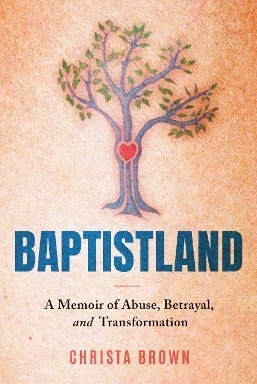“To say the piece set off a firestorm would be an understatement.”
That’s how Mark Wingfield, the publisher of Baptist News Global, described the reaction to this opinion column of mine.
It was a firestorm in which I got burned.
Time has passed, and I’ve tried to get perspective on it. But still, I struggle to fathom how that column generated so much heat.
I’m not wanting to re-debate the column’s substance, but just to give you the gist, it was an effort to express concern about a structural problem in how the Southern Baptist Convention said it was operating its sexual abuse hotline and to urge institutional transparency. It was a column out of conformity with the optimism that many felt at the time.
But I suspect most of those who piled on in criticism of me—and “criticism” is a mild word for what some of it was—had never read the column. Instead, it seemed they were responding to what others said it said, as though in some children’s game of gossip.
So why am I writing about this now?
Because I’m still trying to understand what happened. Because I want to be honest about the pain of what I experienced. Because writing is often how I process difficult things. And because I’m hoping I may find some lessons in it.
People often praise me for being “tough.” And it’s certainly true that I’ve grown a thicker skin; if I hadn’t, the incivility and vitriol of Southern Baptist leaders would have knocked me to the ground and kept me there.
But a thicker skin doesn’t mean I don’t have feelings. Working at exposing abuse in the SBC, I’ve developed such a habit of simply hardening myself and carrying on that, sometimes, I fail to let myself feel what I feel… as though I’m afraid if I acknowledge the hurt, it may incapacitate me.
It’s also true that, for many child sex abuse survivors, minimizing one’s own emotions is a pattern carried into adulthood; it’s one of those things I keep working on.
So that’s part of what I’m doing. I’m just saying it out loud: This was something that hurt a heckuva lot, and no, I can’t just pretend it didn’t happen.
To the contrary, when I recently saw an apparent pile-on against another clergy sex abuse survivor, it resurrected the pain and made me weep for what I knew she was feeling.
Nothing — absolutely nothing — hurts quite so much as being fired on by those presumed to be allies.
How the firestorm began
It started on social media when a survivor with a large following accused me of blatant mistruth. (But of course, I had given to Baptist News Global documentation of the factual backup behind my opinion column, as is common practice.)
Her tweets generated outrage.
Strangely – and gratefully – it was a Southern Baptist pastor who immediately came to my defense, suggesting she might want to reconsider her wording because she was impugning my integrity and he couldn’t believe that I was a liar.
His words went unheeded; she doubled-down; and something akin to mob dynamics seemed to take over. Twitter isn’t a medium designed to bring out people’s more reflective selves.
In addition to the public postings, there were things said about me that carried the vibe of “mean girls in the high school cafeteria.” (This was actually a phrase another survivor used in telling me of her own feelings after a similar experience.)
How the firestorm grew
Then came the letters that repeatedly accused me of “lies,” labeled my opinion column as “a total lie” — sometimes in all caps — and called on both Baptist News Global and me to make public apologies for the “lies.”
Here’s how Mark Wingfield summarized what was happening:
“Christa has been denounced by some of her best allies in the survivor community for pointing out an obvious conflict of interest that’s not sinister, just unwise. What Christa attempted to do was to call attention to a structural problem without indicting an individual whom she admires. But all her critics saw was an attack on another beloved ally for abuse victims. People felt like they had to take sides – as though this were a national championship football game.”
Again, I wondered: Did the critics even read my column? It didn’t seem so.
I’ve written scores of opinion columns and over 500 blog postings, always trying to bring truth to light about abuse and coverups in the SBC. Yet, some seized on a single sentence — and maybe just a single word — and used it to denounce me, while apparently missing the thrust of what I was saying about the SBC’s need for transparency.
Again, I felt the burn of it.
No doubt there could be different opinions about the meaning and import of the available facts, and about what constitutes a potential conflict of interest, but differing opinions does not render one person’s opinion into a lie.
There must be a hundred ways to disagree with someone, and leaping to label someone a liar is one of the harshest. Sometimes, it may say more about the person doing the leaping than it does about the person who gets labeled.
It hurt to my very bones. This was disparagement launched by those in my own community — by presumed allies — who were apparently angry that I didn’t believe what they believed or trust who they trusted.
Perhaps in the age of Donald Trump, some don’t think it’s a big deal for someone to be accused of lying. Or even publicly accused. But it was definitely a big deal to me.
To label someone as a liar is not merely to say that they made a mistake, or to say that their facts are erroneous; it’s accusing them of having an intent to deceive.
Meanwhile, the SBC hotline remains problematic
My column caused three entities to issue clarifying statements: the SBC’s Abuse Reform Implementation Task Force, the SBC Executive Committee, and Guidepost Solutions. This fact alone — that three organizations felt the need to issue clarifying statements — seemed to me to demonstrate that the facts were indeed murky and clarification was much needed. It shouldn’t have taken me writing an opinion column to get it.
Sadly, their statements didn’t really clarify much. As is so often the case with Southern Baptists and clergy sex abuse, purported efforts at transparency are often just for-show forms of further obscurity.
There’s still too much that we don’t know about the functioning of the SBC’s sexual abuse hotline and too little evidence of any good that it’s accomplishing. Instead, it seems as little more than a theater piece, presenting an illusion of accountability and care, but without the reality.
“Since its inception, the SBC hotline has created more questions than answers about its purpose, its protocol, its personnel and its product (what it does with the information it collects)… The lack of transparency…places the institution in a position of power and knowledge over victims. Without crystal clarity and transparency, this hotline simply cannot be trusted.”
Boz is right: The hotline cannot be trusted. And the SBC is the only party who benefits from its lack of transparency.
Apology shows the hurt of the SBC’s lack of transparency
A year after that firestorm, I received a written apology from one of the survivors who had called me a liar. Within it, she also expressed her frustration at having ever held hope that the SBC would actually take meaningful action and her anger that she had been made into “an accessory” to the SBC’s propaganda. She described actions at the convention as having been “just another PR stunt by the SBC to get the press off their back” and said that the SBC “made sure there were a lot of press people and a number of victims inside, such as myself, to make others believe they were sincere.”
Personally, I believe she’s right – she and some other survivors were effectively used. What better way for an institution to present an illusion of reform than to show survivors with smiling faces?
This of course is why the SBC’s endless trailing out of unkept promises is so damaging. Many survivors want desperately to believe what they’re told will happen, and for a while they will believe it — sometimes even to the point of defending the institution against skeptics like me. Then they’ll feel duped and betrayed all over again when reform doesn’t actually materialize. And, like this apologetic survivor, some will wind up feeling as though they were yet again exploited for the sake of the SBC’s institutional image-making.
What lessons in all this?
Here are some of the insights I draw from this experience. They’re mainly lessons and reminders for myself, but maybe something in them will resonate with some of you as well.
For anything and everything that SBC officials and their apologists say about the institution’s dealings on clergy sex abuse, skepticism is well-warranted.
Clergy sex abuse survivors are far from monolithic. Some stay in the faith but many don’t. Some still give the faith institution the benefit of the doubt, but many don’t. Those who are more skeptical shouldn’t be berated for it.
Many who have been raised in the fundamentalism of Southern Baptists may hold ingrained tendencies to view issues in black and white, without nuance or proportionality. Even when we leave behind the faith, these inclinations can remain. I try to hold this in mind when I ponder those who fed the firestorm, because it helps me hold compassion.
Forgiveness doesn’t require that you re-trust those who have deliberately harmed you.
Trauma responses can sometimes look like people-pleasing and wanting others to conform. A recalcitrant institution like the SBC can exploit these characteristics for its own ends.
The Southern Baptist Convention merits neither conformity nor loyalty, and least of all from those it has so callously wounded without care.
If any might consider labeling a #ChurchToo survivor as a liar, or piling on with others for some kind of collective shaming, I hope what I’ve written here may give pause to think twice.
There’s a difference between punching up at a powerful multi-billion dollar institution and those who serve it, and punching down at individual #ChurchToo survivors. Let’s all do more of the punching up.
Check out my book, Baptistland: A Memoir of Abuse, Betrayal, and Transformation. (And… Boz Tchividjian wrote the foreword for it!)







I appreciate this so much, Christa. Being attacked and called a liar for expressing warranted skepticism is a horrible experience. I’ve been through my own versions of this. As with everything you write, this made me feel less alone.
You are not being silent, you are resisting evil and exposing it. And this evil is in the marrow of our bones. Sister, having done all stand. Let those who love and know you stand close and give you protection. Thank you.